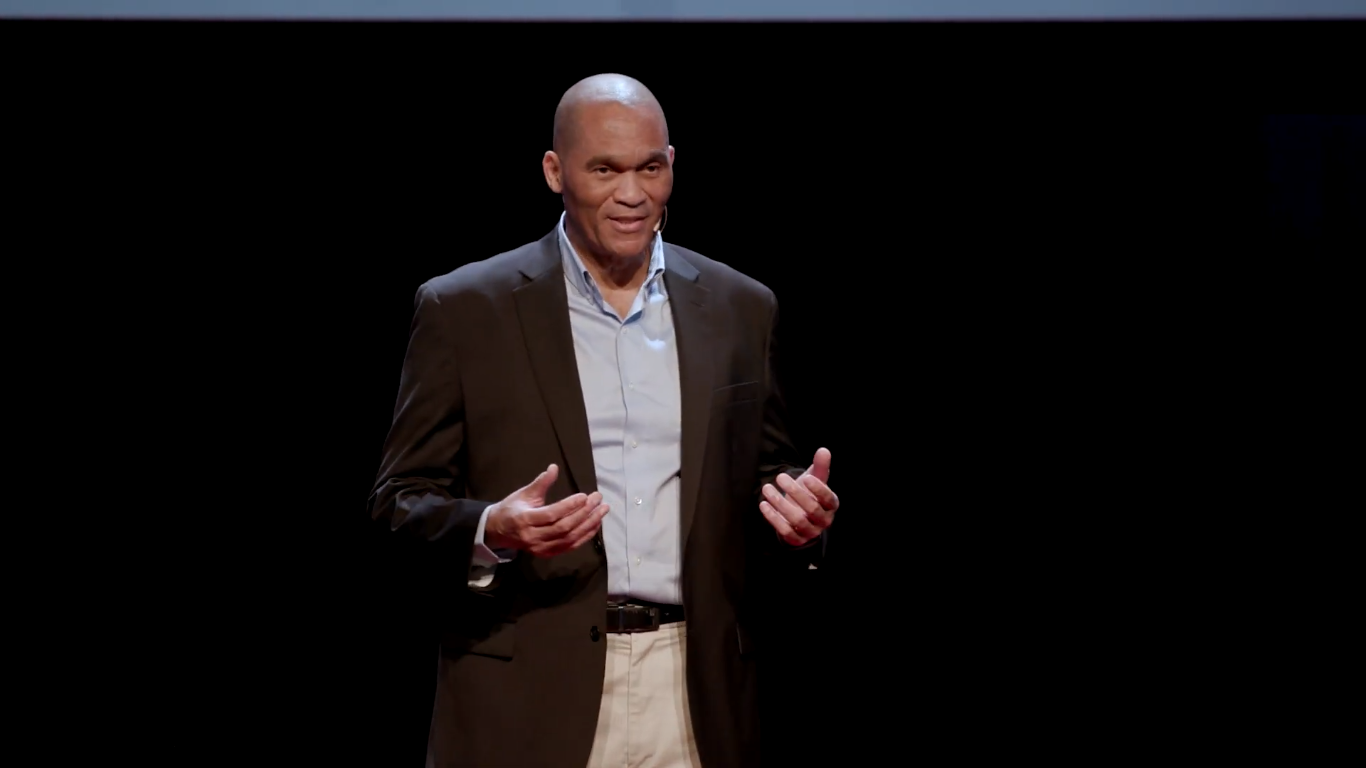In his compelling TEDx talk, a mental health professional shares his journey of overcoming major depressive disorder and anxiety, drawing strength from his grandparents’ wisdom and his own experiences. He emphasizes the importance of resilience, community support, and understanding the paradox of depression. Through his story, he inspires others to face their fears, seek help, and rise above their mental health challenges.
Speech:
Thank you. Good afternoon, everyone. Wow, this is truly a bucket list activity for me. At my age, it’s unbelievable. I’m honored to be here on the TEDx stage today, participating with so many amazing speakers. I’m sure you’re here for the rest of today.
I was talking to my wife before we came here today, and I was saying I’m very nervous about this TEDx event. I told her, you know, what helped me in my life in terms of the challenges I’ve had has always been taking risks, and this is a risk for me. I just want to let you know, especially you young people out there, regardless of what you’re going through in life, face your fear. Face your fear, and this is one of those moments where I’m facing my fears.
So right now, what I would like to do, I’d like to take a brief poll. By a show of hands, can you tell me personally how many of you have experienced depression or know of anyone who has experienced any type of depression ever in their lives? By a show of hands, okay. Hold your hands up. Hey guys, look around, please. Everyone, take a moment, hold space, and look at all the hands that are up. Great, thank you.
What that tells us is that mental health, in terms of depression, is a very common issue for a lot of people, and that we all should become more informed and sensitive about depression. Depression doesn’t care if you’re rich or poor, young or old, famous or not. The World Health Organization says depression is the leading cause of disability in the world, and some types of depression are so debilitating they drive people to end their lives.
But there’s a different perspective that I’d like to share with you today that may surprise you. Depression has an upside. Can you believe that? It has an upside. Some scientists say symptoms of social withdrawal, poor concentration, sadness, hopelessness may not be a part of a mental disorder at all, but they are adaptations—they’re the paradox of depression. So instead of succumbing to your depression, listen to what your depression is trying to teach you. In Latin, depression means to press down, to be poured down in spirits. What are you pressing down in your lives right now? Think about it. Is there something pressing you down?
The stress of life inevitably is going to pull us all down with something, and when that happens, we cannot stay stuck. We have to get up. I often think about being stuck and compare it with an overloaded circuit breaker in our homes. Yes, the power cuts off when there’s too much pressure on the line. What do we do? We get up, figure out what’s overloading the system, and remove it, then the lights come back on. Our minds are like that in some ways. When we’re overloaded with fear and worry, some of you now in the audience may be dealing with your own stressors. Maybe you’re going through a health crisis, maybe you have a family member dealing with a health crisis, maybe some of you are going through a breakup or divorce, or maybe some of you have unfortunately lost someone near and dear to you. When these things happen, our surge capacities get overwhelmed. We know what that feels like—we went through it with COVID, right? We all know what that feels like. It’s called the allostatic load, and when that happens, it’s the maximum amount of stress that we all can endure, and when we exceed it, nature takes us offline. Some people become depressed, some people disassociate, some people become numb. It’s the mind and body’s way of saying, “Hey, what you’re struggling with, you’re overwhelming me. Get some help.”
I’ve been a mental health professional for over 35 years. I’ve helped nearly a thousand children and adults with childhood trauma and anxiety work through their depression. Early in my career, I was featured in a Washington Post cover story titled “Saving Families One on One.” I learned from my grandparents a long time ago how to recognize when someone is depressed and how to help them. When I was 10 years old, I remember coming home from playing outside with two friends. I was tired and thirsty, and I asked my grandfather for some money so that I could buy something to drink. He put his hand in his pocket, pulled out a handful of coins, gave me a quarter, then he turned around, looked at both my friends, and gave them the biggest smile. Their faces lit up. He walked over to them, gave them a quarter too, and patted them on the back. But in my mind, I was so jealous. I was like, “Dad, he should have given me that 50 cents.” But seriously, my grandfather said, “I don’t know what’s going on in those kids’ homes. There are a lot of stressed-out people in the world.” He said, “There are a lot of stressed-out people around here.” I got the lesson—stress can cause depression. I learned a long time ago that a kind gesture can go a long way to helping someone feel better.
It’s very challenging to get up here and share your heart’s story when it’s so important to you. For those of you who came expecting a flawless TED talk, I’m sorry, but my heart is in this, and I’m going to get through this because I want to teach my kids that regardless of how difficult something is, you push through it. Regardless of how stressful it is, you don’t give up. This is one of those challenges in my life where I’m going to get through this adversity. Mental health-wise, I’ve gotten through a lot of challenges with my own mental health, and this is not going to stop me now.
I got the lesson—stress can cause depression, and a kind gesture can go a long way in making someone feel less depressed. Acknowledge them. My grandparents were onto something so long ago because I now know as a therapist, having worked with countless adults and people with depression, that more people than some of you may realize have adult depression. But I’ve been inspired by their resilience, their determination, and their healing. My grandparents inspired me too. They inspired me to go to college, and the day that I graduated from college was one of the happiest days of my life. To have my grandparents standing there with me on stage was unbelievable. When I walked off the stage and got my diploma, to see my grandfather with his chest poked out—it was weird because my grandfather was a humble man, and on that day, he was proud as a peacock. I didn’t understand why, but after all these years, I realized why he was so proud. I was the first grandchild to earn a college degree, and my grandfather only had a fourth-grade education. So I realize now why that was so important to him, and the smile on my grandmother’s face was simply priceless. They knew getting a college education was my ticket out of poverty.
After I graduated from college, I was looking forward to the next chapter of my life. I had my grandparents and my high school girlfriend with me. After I graduated from college, I got a call one day. What? No! Are you serious? I got a call—my high school coach had died. He was just in his 40s. He was my role model. He was like a father figure to me. I couldn’t believe it. I was shocked. Two months later, an uncle died. What is going on? I was so confused. Then my high school girlfriend broke up with me. At a time when I needed her the most, she broke up with me. I was so hurt. Several weeks passed. As I laid in bed thinking about my grief, thinking about my losses, my grandmother called out to me in the middle of the night, “Darl, Darl!” I rushed to her side. She pointed to my grandfather. He was sitting in the corner, grasping for air at his chest. I went to touch him. He said, “No, don’t touch me. Get help! Get help!” He was taken to the hospital. My grandfather would never come home. He died from a blood clot that traveled to his heart and killed him. I was in shock. My hero was dead. What do I do now? Two months later, my grandmother would die from a broken heart. Her life partner for more than 50 years was gone. What do I do now when everyone that mattered to me was gone?
I was depressed. My life began to spiral. I was just 23 years old, not even a year out of college, and now I found my life was meaningless. What do I do? But then my grandparents told me something, something that I think I just displayed on this stage today, that regardless of how hard things get, regardless of how depressed you are, you don’t quit. They told me there’s always someone worse off than you. You go back to your community and help someone. I went back to my community. My community back in those days was called the murder capital of the nation. Young black boys and youth were dying in record numbers due to the crack cocaine epidemic. I figured I had lost so many lives in my life; why not try to save a few? I went back to my community and started a nonprofit organization called Youth Entrepreneurial Services to mentor teens. Within a short while, the Washingtonian Magazine named me a Washingtonian of the Year. Then USA Today newspaper put me on its cover, and they called me a national hero. But I didn’t feel like anyone’s hero. The real heroes were the children and the parents who were fighting every day to survive from the drive-by shootings and other senseless killings taking place in my city. I was just trying to make a difference.
Then I got invited to the White House, and me and my high school girlfriend got back together and had our first child—that’s a whole other TED talk, y’all. We had our first child, and I named my
son James after my grandfather. I was proud of my son. I wanted to be there for him as a black male father. I didn’t want to disappoint him like my father disappointed me. Even though I was in the throes of depression, I never quit, just like I didn’t quit the day on the stage. I didn’t want to fail my son. I loved him every day. One day, as I played with him in his crib, gunshots rang out. I grabbed my son and fell to the floor, trying to conceal my fear. As I made my way to the window and peered out, I saw another black youth’s dead body riddled with bullets—another young life snuffed out way before its time. As I pulled away from the window and blood poured from his body, I fell to the floor and grabbed my son. I said, “What type of life is this for us?”
Several months passed, and I woke up one day, and all the life in me was gone. Everything went black. I was depressed. I felt like I couldn’t go on. The psychic ache was too great for me to endure. So I went down to the Potomac River. I went down to the Potomac River because my despair was too much for me to bear. I said, “How come? How come I have to live like this? I can’t go on.” I made my way to the edge. I was determined. I walked to the edge and stood there. I had disassociated. Life had no meaning—nothing. Everything was gone. I said I couldn’t live like this anymore. I walked to the edge and stood there. Then I thought about my young son. I thought about my wife. I said, “What about all the kids you mentored? What would become of them?” As I stood there on the edge, an eerie silence blanketed me. It was as if my grandparents were standing right beside me. I moved closer to the edge and looked out over the still, quiet water. On that day, I walked away from the edge. I decided to ask myself and learn from the lessons my depression was trying to teach me.
It’s been 25 years since I had major depressive disorder and every anxiety disorder a person could have. If you’ve never been through that, if you have that experience, you know what that feels like. I overcame them all. If you’re going through that today yourself, you can overcome it too. In 2013, when my son James, named after my grandfather, walked across the stage and received the Male Career Achievement Award from Harvard University, I too had my chest poked out like my grandfather did so many years ago because I knew we both had achieved against the most amazing odds.
I’m going to say to you people listening with depression and any other mental health issues, depression may slow you down, depression may beat you down, depression may even cast you down, but you can rise up above your depression and live to achieve your goals. I say to you, don’t let the darkness of depression put out your bright light. Get some help, folks. Get some help. Thank you.




Leave A Comment